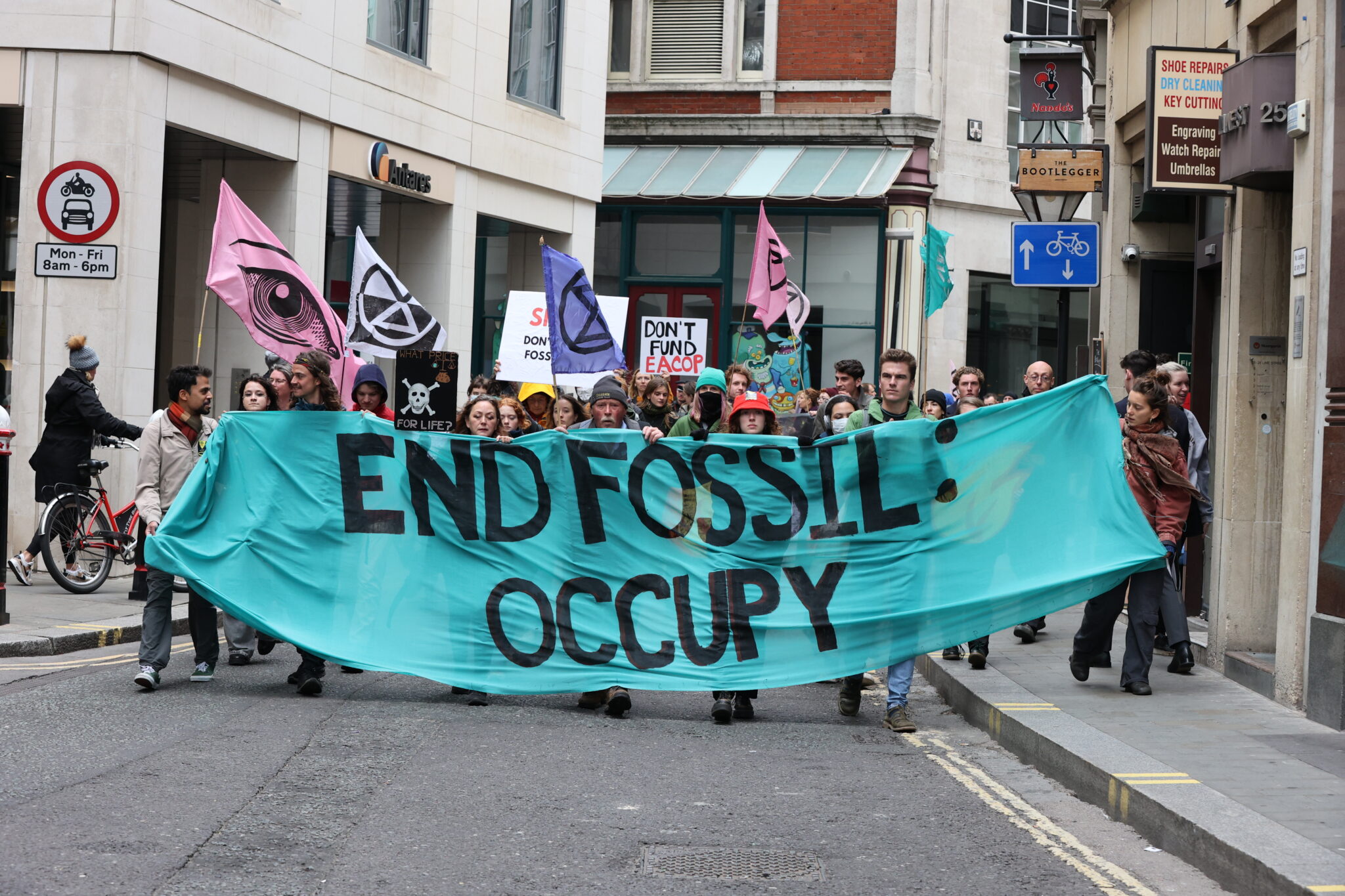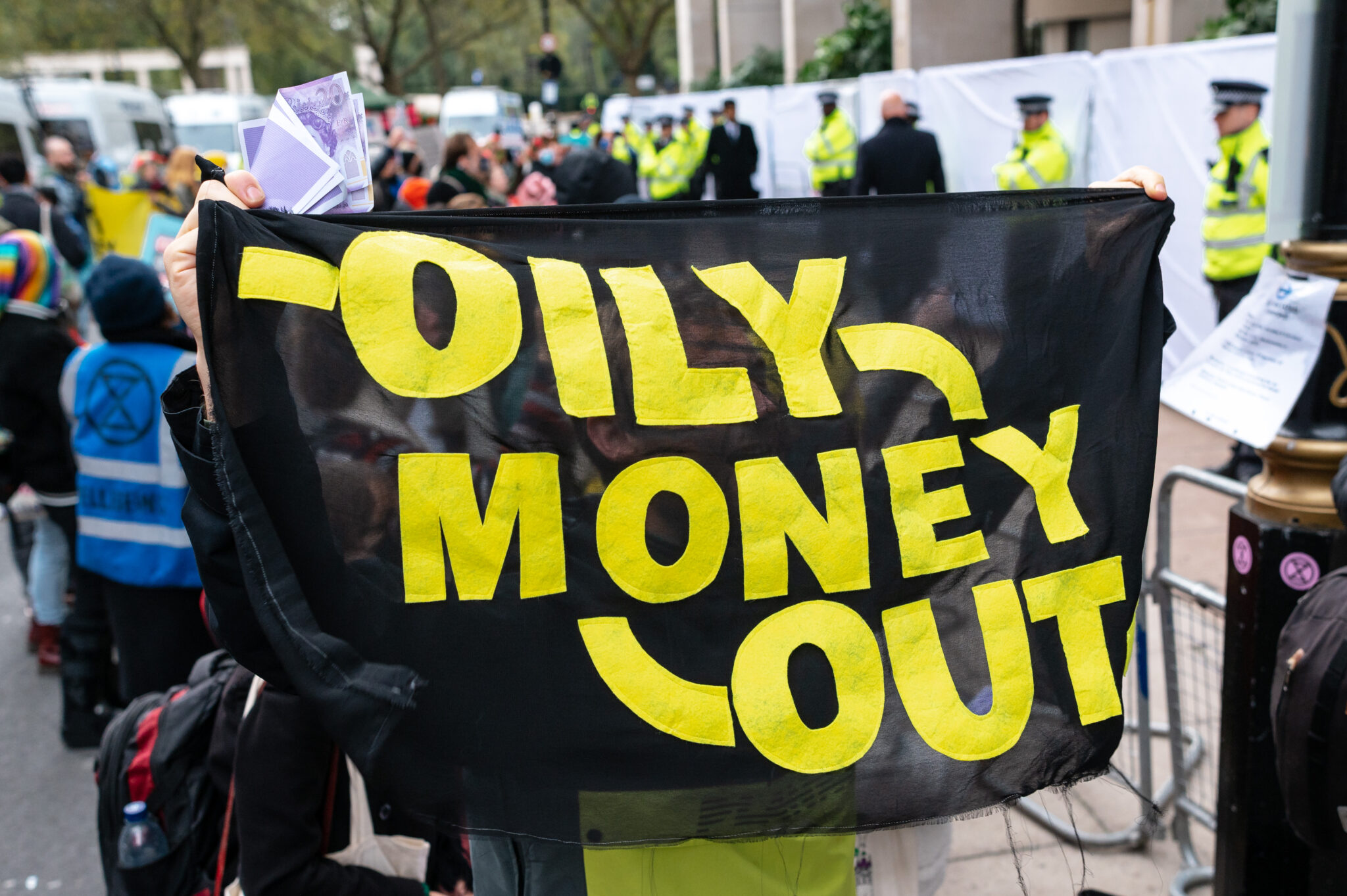Protesters occupy City Of London insurers’ offices demanding they reject climate-wrecking projects in UK and Africa

Ten City of London insurance companies are targeted by activists calling on them to stop insuring West Cumbia coalmine and East Africa Crude Oil Pipeline NOW!
Hundreds of protesters occupied City of London offices of ten Lloyd’s of London insurers demanding they rule out insuring the proposed West Cumbria coal mine and the East Africa Crude Oil Pipeline (EACOP).
The occupations started as a huge crowd gathered outside Standard Bank. The protests are in collaboration with Fossil Free London’s “Oily Money Out” mass action – at which Greta Thunberg was arrested yesterday – and in solidarity with Extinction Rebellion Gauteng in South Africa. In Johannesburg activists were recently met with brutality by security personnel hired by Standard Bank as they peacefully called for dialogue to end the financing of new coal projects.
The protesters marched waving banners saying “Don’t Insure EACOP” and “Don’t Insure West Cumbria Mine” to three high profile buildings including the “Walkie Talkie” where in a coordinated swoop, activists occupied the office foyers of Ascot, Talbot, Chaucer, Markel, Allied World, CNA Hardy, Tokio Marine Kiln, Sirius International and Lancashire Syndicates. The activists are staging a sit-in and refusing to leave.
Insurers from Lloyd’s of London have come under increasing pressure to rule out offering insurance to both the West Cumbria coal mine and EACOP, including protests at offices across the UK with hundreds of students entering the job market refusing to work for them.
Claude Fourcroy, a spokesperson for Money Rebellion said: “We are calling on all the banks and insurers behind the West Cumbria mine and East Africa Crude Oil Pipelines to cut their ties now. Both of these projects will fuel climate breakdown. Lloyd’s of London and the insurers in its market sit at the centre of a web of climate wreckers in the City of London, alongside Barclays and HSBC.”
Community members from Cumbria and Uganda joined the protests, sharing the united call to insurers and banks to stop underwriting fossil fuel projects. The UK Climate Change Committee warned that the West Cumbria Mine would increase UK’s domestic emissions and make the government’s legally-binding domestic emissions budgets difficult to meet.
The massive 1443 km East Africa Crude Oil Pipeline will wreak havoc on communities, jeopardise ecosystems and water supplies. and eliminate the possibility of Earth remaining habitable. There can be no new fossil fuels anywhere if global heating is to remain under 1.5C.
Scientists say we are dangerously close to crossing the globally agreed threshold of 1.5C this year. Neither project will proceed without financial and insurance backing.
Andrew Taylor, Coal Action Network said: “West Cumbria Mining Ltd wants to dig coal here right up until 2049 – when we’re supposed to have reached net zero by 2050! They’re not looking at the impact of how burning it would damage the climate and nature. The UK government talks about us having energy security but the truth is, if the mine goes ahead, 85% of the coal would be exported.”
Patience, a youth activist from Fridays for Future Uganda said: “We have gathered here today to demand that insurers cut ties with EACOP. By supporting this deadly fossil fuel project they undermine any climate commitments they have made. People in Uganda are facing human rights violations in the name of this project. This has to end.”
Fossil Free London is simultaneously disrupting the Canary Wharf offices of Total Energies, a majority shareholder in EACOP.
The protests come on the second day of the Fossil Free London “Oily Money Out” protests targeting the Energy Intelligence Forum at the InterContinental Park Lane Hotel in London, where fossil fuel corporations, including Shell, Total and Equinor, are talking to government ministers. The Forum is taking place in the run up to the COP28 Climate Conference, which has already been captured by the fossil fuel industry, with the appointment of Al Jaber, chief executive of the Abu Dhabi National Oil Company (ADNOC) as the COP28 President.

Joanna Warrington, campaigner with Fossil Free London said: “We can’t allow London to welcome the climate-wrecking elite when droughts, floods, and wildfires rage across the world. London’s banks and finance sector have been ignoring all the warning signs while pouring billions into fossil fuel expansion. Their profit is our loss. Financing new fossil fuel developments is incompatible with a safe future.”
